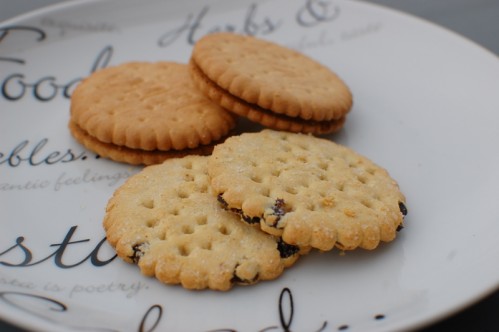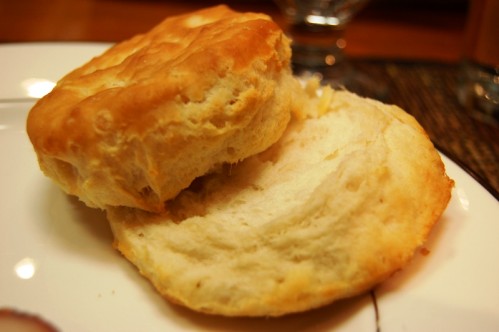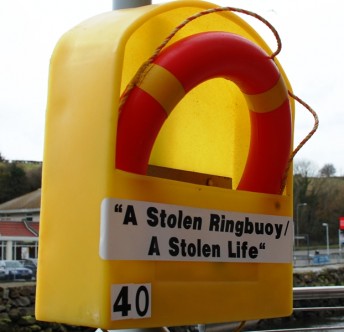Tue 23 Mar 2010
Lost in Translation
Posted by Clare under Irish food, Irish slang, Moving to Ireland
[9] Comments
In Ireland, these cookies are “biscuits.”
The other day, my friend Sinead was telling me about a peculiar town in England that we need to go visit. She said it was a small community full of very strange people.
“They have no teets!” she said.
What??? No teets!? I imagined a town of nipple-less women, walking down the street in slow motion like zombies in a horror film. Was there something in the water that caused this deformity? How did they feed their newborn babies? I surmised that bra sales in this region must be low, perhaps even non-existent.
“Why don’t they have breasts?” I asked, still trying to wrap my brain around this bizarre phenomenon.
“What? No, they have no TEET!” she said again, pointing to her mouth.
Ohhhhhh. Teeth. Right.
In America, this is a biscuit. In Ireland, it’s a scone.
This sort of misunderstanding happens almost daily between me and my Irish friends (and shopkeepers, taxi drivers, bartenders, etc.). While I’m certainly used to the Irish accent, some words just don’t register right away. Another issue is that about 50% of the words spoken here consist of slang terms that I’ve never heard before.
There’s also the predicament of pronunciation: Last week, when I was still looking at apartments, I visited a place on South Quay. My friends kept asking me how the apartments on “South Key” are. Key? It’s quay (“koo-way”), which would rhyme with sway or away or okay. “No, it’s KEY, that’s how you say q-u-a-y.” Well then, how do you pronounce the thing you use to unlock a door? “The same way,” they said. Somehow this makes sense to the Irish.
Don’t jump! But if you do, this boy will save you!
I live right on the Boyne River, and there are life rings featured along the river’s bridges in case someone jumps or falls into the water. The [dramatic] sign on the life rings say, “A Stolen Ring Buoy, A Stolen Life,” which is there to discourage people from stealing the floatation devices. I once said it out loud as we walked past, and was quickly corrected by my friends. “It’s a ring BOY, not booo-ee.” Uh, it’s buoy, pronounced booo-ee. “Nope, it’s boy, like in boy,” they insisted. Well then, how do you spell boy, as in a child of the male species? “Same way.” Sigh.
There are also plenty of words the Irish use that don’t – at least to me – live up to their meanings. Examples:
- Thump: Same as punch, as to punch someone. “He got a thump to the head, so he did.” A thump sounds so gentle, like if a big, furry stuffed animal gave you a playful thump in the head, causing you to giggle endlessly. It just doesn’t have the ferocity of PUNCH.
- Punter: Means the average paying customer. “The punter’s opinion on the new Italian restaurant in town is that it needs work.” I always envision an NFL kicker when I hear that word. I often think, Why are American football kickers quoted so often in the Irish papers?
- Shifted: Means kissed. “Oh she shifted him behind the bar the other night.” When I first heard this phrase, I imagined that the guy had been robbed, shot or beaten up because I thought of the word shifty, which in the U.S. also means shady or suspicious. Nope, the guy just got kissed. So, so odd.
And I cannot write a post about Irish verbiage without including something about nicknames. The Irish LOVE to give nicknames to each other, and some are based on almost nothing at all. Case in point: My friend Bushman (real name: Garon). In America, the word “bush” is often used to describe a woman’s nether region. So if one is called “Bushman” most people would assume it was based on something salacious (this reminds of the infamous “Ass Man” episode of Seinfeld). A bushman is also an indigenous person of southern Africa, but Garon is quite white and Irish so that wouldn’t make much sense. The real explanation? “He jumped over a bush once and fell.” Why this particular, seemingly mundane event inspired a life-long nickname, I will never fully understand. Yet it suits him.
Though sometimes I feel a bit lost in translation, working my way through the charming and head-scratching lingo is actually quite fun. Or, should I say, it’s good craic!






Too funny Clare!!
This IS funny!! but we experienced some pronunciation wake up call when we first moved to Arkansas – thought they were speaking foregn language. It was just heavy Southern accent.
Remember TEN was TIN? Four was FOWOR, ha, ha.
Clare! So good to know you are doing well. Ganbatte! : )
Ha! Very funny- especially “they have no teets”. I’m English but I’ve got a few friends from New Zealand and sometimes when they say things, whether it be because of their accent or because it’s one of their slang terms, I do just stand there for a second completely and utterly confused and thinking “what on earth are you talking about?!”.
I have to say, it never occured to me that anyone wouldn’t pronounce quay as key and buoy as boy! I know they’re quite strange spellings but I’ve never heard them said any other way.
Roisin: Thanks 🙂 I’m sure there will be plenty of funny stories to come, especially with the crazy lot we hang out with!
Mom: I guess I was so young I barely remember that, but yes, this experience is very similar 🙂
Kayo: Thank you! Welcome back and hope you are well.
Catherine: I have NZ friends as well and have a hard time understanding them at times too. They seem to replace “a” with “i” – like, instead of “fantastic” it’s “fintistic!” Honestly I have never heard quay pronounced as key – a total ear-opener!
I’m Canadian and I pronounce Quay as Key, and buoy as boy, I’m not in any way Irish either. *shrugs*
I’ve never heard them pronounced any other way.
I’ve also heard biscuit and scone used to describe the same product here, though usually it’s the little coffee shops or starbucks that use the word scone. Either way they’re delicious! 😛 Cookies are cookies here though (unless you’re reading the french)
The Teets thing made me giggle. 🙂
Clare, we’ve been through this before. How do you pronounce Arkansas? And why, if a word has an ‘h’ at the beginning, would you not pronounce it? The word is herb, not ‘erb! :p
Quay is indeed pronounced “Key”, but I say the Irish are wrong about Buoys. It’s definitely “boo-eee” haha. 😀
The “They have no teets” made me laugh.
Everyone I know has always pronounced quay as “key”, though, and I grew up in Washington (state). Buoy… I’ve heard that either way. I tend to go with “boo-eee” 😀